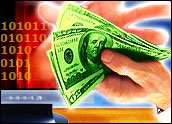Time of the electronic money is coming?
Since the 1990s, the expansion and popularity of the Internet has created a method of purchasing and selling online (e-commerce). Most people expect one day that paper money will no longer be a payment method in trading sessions.

What is electronic money?
Electronic money began to be used in the late 1990s, based on predictions about the number of customers using credit cards to make purchases.Converting paper money into electronic money ( e-money) seems to be an attractive solution.
Concept: Electronic money
Electronic money (e-money, also known as digital cash) is a system that allows users to pay when purchasing or using services by passing numbers from one computer to another. other.Like serials on paper money, the serial number of electronic money is unique.Each electronic "sheet" is issued by a bank and is represented for a certain amount of money.The characteristic of electronic money is the same as the real paper money, it is anonymous and can be reused.That is, the buyer will pay a certain amount to the seller and there will not be any method to get information about the buyer.It is also a distinctive feature between electronic money and credit card payment systems.
During this time, the first activities of electronic money began to invade the Web.But this kind of money is still too small compared to using a credit card.Used for the main purpose of online trading, these currencies are issued by companies like Beenz.com, Flooz.com and some other companies.
However, in the recession of 2000, many "dot-com" companies were established, but were quickly broken and became "dot-bomb" companies.Therefore, electronic money is also a matter of careful consideration and review.
Japan: Electronic money thrives
Today, Japan has 15 million electronic currency users.For these users, paper money is something in the past.Paper money is rarely used for online shopping, electronic money is accessed via smart cards or via mobile phones, and has become the lifestyle of consumers in Japan.
In Japan, electronic money began 4 years ago and is known as a monthly fare payment service when traveling by car.Today, they are integrated into smart cards and mobile phones to shop from small stores, large stores, restaurants, to supermarkets, retail stores . According to the Japanese Research Institute. In 2008, Japan will have about 40 million users - that is, one third of the country's population will use electronic money.
Japanese Economic Monthly reported: Last year, NTT DoCoMo - Japan's largest media company, sold 3.34 millionFeliCa-equipped handsetssince April 2005.In 2005, the proceeds from electronic transactions doubled.Some large Japanese supermarkets have reported that 40% of their purchases use electronic money.
How does the US use electronic money?
How has the United States - the world's largest economy and the center of high technology in the world - changed?
Yankee Group senior analyst, Joe Levine is skeptical that paper money or coins will soon "disappear": " Creating an American society that only uses mobile phones and smart cards needs one trying, making a great contribution from credit card providers, mobile phone service providers, factories and retail shops . Japan could make such great strides because because companies like DoCoMo have a huge market share in this industry, for example, DoCoMo only needs to invest 900 million USD to achieve 34% of capital in Sumitomo Mitsui Card - the second largest credit card company of Japan. That credit card provider started developing payment machines and ATMs used with DoCoMo's handheld devices. "
Charles Goldfinger, a senior financial advisor and smart card-based financial applications, agrees: " DoCoMo seems to have a monopoly on this market and it has nearly 50 million subscribers make electronic money very successful in Japan, the US telecommunications market is completely different, in fact, the US telecommunications market is dominated by several telecom providers. The deployment of electronic money becomes standard is not easy. "
Currently, Cingular has conducted a test of using the electronic money system at Atlanta's Philips Arena, the Hawk and Thrasher "home".The service uses a mobile phone from Philips, which is equipped with NFC technology, ready for about 250 fans.These "fans" need to use a Visa account at Chase bank and then they can use their mobile phone to buy tickets and go on to cheer the team.
Next, credit card issuers also deploy contactless credit cards like Chase's Blink, MasterCard's PayPass, Visa's Contactless, and American Express's Express Pay.Cards using NFC integrated chips can avoid theft and tampering with signatures.Instead, the user only needs to return the card reader to the completed session.To learn more about NFC technology, you can refer to the article:NFC: New technology turns mobile phones into electronic wallets
"Goodbye" paper money?
However, upgrading the payment system will consume the investment costs of business firms.It is similar to the chicken and egg problem.Businesses are often "reluctant" to invest in technology to bring convenience to customers.Moreover, customers are always cautious when using new technologies.
This has made success and support for electronic money low.Just like the case of paper money will still exist after the check is issued.Therefore, the possibility of paper money will coexist with electronic money.In particular, electronic money cannot eliminate credit cards and debit cards altogether.
Electronic money will also need more time to truly mature.When telecom providers switch to 3G technology, they will be a necessary and solid infrastructure to support online transactions and payments with mobile phones.At that time, electronic money will really "take off", a solid fulcrum for e-commerce.
Minh Phuc
You should read it
- ★ Stealing, electronic money scams in 2019 may hit a record of $ 4.3 billion
- ★ The Cuban government considered using electronic money to overcome US sanctions
- ★ New electronic paper technology allows users to comfortably draw with almost nonexistent latency
- ★ The biggest problem with Facebook's electronic currency: Trust
- ★ Detecting new electronic phishing malware, redirecting payment transactions to attackers